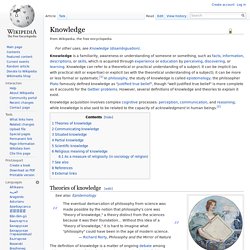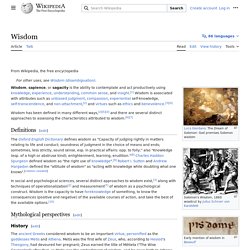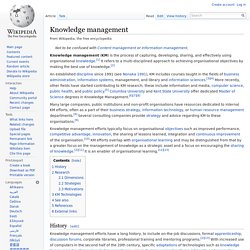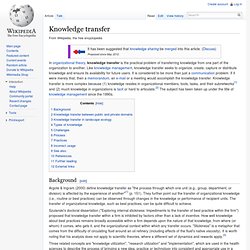

KM (misc. videos) KM Knowledge management. Knowledge management. KM Knowledge management. Knowledge. Knowledge acquisition involves complex cognitive processes: perception, communication, and reasoning; while knowledge is also said to be related to the capacity of acknowledgment in human beings.[2] Theories of knowledge[edit] In contrast to this approach, Wittgenstein observed, following Moore's paradox, that one can say "He believes it, but it isn't so," but not "He knows it, but it isn't so.

" [5] He goes on to argue that these do not correspond to distinct mental states, but rather to distinct ways of talking about conviction. What is different here is not the mental state of the speaker, but the activity in which they are engaged. For example, on this account, to know that the kettle is boiling is not to be in a particular state of mind, but to perform a particular task with the statement that the kettle is boiling. Wittgenstein sought to bypass the difficulty of definition by looking to the way "knowledge" is used in natural languages. Wisdom. The ability to think and act using knowledge, experience, understanding, common sense and insight Wisdom Defending Youth Against Love by Meynier, c. 1810 Wisdom, sapience, or sagacity is the ability to think and act using knowledge, experience, understanding, common sense and insight.[1] Wisdom is associated with attributes such as unbiased judgment, compassion, experiential self-knowledge, self-transcendence and non-attachment,[2] and virtues such as ethics and benevolence.[3][4] Wisdom has been defined in many different ways,[2][5][3] including several distinct approaches to assess the characteristics attributed to wisdom.[6][7] Definitions[edit] The Oxford English Dictionary defines wisdom as "Capacity of judging rightly in matters relating to life and conduct; soundness of judgement in the choice of means and ends; sometimes, less strictly, sound sense, esp. in practical affairs: opp. to folly;" also "Knowledge (esp. of a high or abstruse kind); enlightenment, learning, erudition.

Knowledge management. Knowledge management (KM) is the process of capturing, developing, sharing, and effectively using organizational knowledge.[1] It refers to a multi-disciplined approach to achieving organisational objectives by making the best use of knowledge.[2] An established discipline since 1991 (see Nonaka 1991), KM includes courses taught in the fields of business administration, information systems, management, and library and information sciences.[3][4] More recently, other fields have started contributing to KM research; these include information and media, computer science, public health, and public policy.[5] Columbia University and Kent State University offer dedicated Master of Science degrees in Knowledge Management.[6][7][8] History[edit]

Kmbasic.pdf (объект «application/pdf») p100.pdf (объект «application/pdf») Introduction to Knowledge Management. Online_Knowledge according to 817 philosophers.pdf (объект «application/pdf») JKM-9-6d.pdf (объект «application/pdf») Knowledge transfer. In organizational theory, knowledge transfer is the practical problem of transferring knowledge from one part of the organization to another.

Like knowledge management, knowledge transfer seeks to organize, create, capture or distribute knowledge and ensure its availability for future users. It is considered to be more than just a communication problem. If it were merely that, then a memorandum, an e-mail or a meeting would accomplish the knowledge transfer. Knowledge transfer is more complex because (1) knowledge resides in organizational members, tools, tasks, and their subnetworks[1] and (2) much knowledge in organizations is tacit or hard to articulate.[2] The subject has been taken up under the title of knowledge management since the 1990s.
Background[edit] Argote & Ingram (2000) define knowledge transfer as "the process through which one unit (e.g., group, department, or division) is affected by the experience of another"[1] (p. 151). Electronic Journal of Knowledge Management. 65_defining knowledge economy.pdf (объект «application/pdf») 15762270n9p263.pdf (объект «application/pdf») Creating_a_K-Sharing_Culture_-_Gurteen.pdf (объект «application/pdf») Engstrom.pdf (объект «application/pdf») Knowledgemanagement. Knowledge management.
Data 2 Wisdom - D.I.K.W. General Knowledge. Knowledge Management. Knowledge Management. Knowledge Management. Knowledge management.